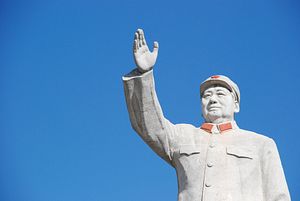December 26 is the birthday of Mao Zedong, and 2013 was a particularly important celebration. This year marked the 120th anniversary of Mao’s birth. In celebration, Xi Jinping and Li Keqiang visited Mao’s mausoleum in Beijing and also attended a symposium on Mao at the Great Hall of the People. At the symposium, Xi promised to raise the banner of Mao Zedong Thought “forever.” However, Xi also cautioned that Mao, like other “revolutionary leaders” were “not gods, but human beings.” China “cannot worship them like gods or refuse to allow people to point out and correct their errors just because they are great.”
Of course, Xi Jinping is not calling for an open public debate over the positives and negatives of Mao’s rule. Rather, Xi was providing himself an outlet for reinterpreting certain strains of Mao Zedong Thought to fit more closely with Xi’s own policies. Xi noted that “today’s condition and level of development and understanding” are different than the historical conditions under Mao. “Under the new conditions, Party members should adhere to and make good use of the ‘living soul’ of Mao Zedong Thought,” People’s Daily quoted Xi as saying.
The beauty of this concept is that Xi is able to define the “living soul” of Mao Zedong Thought. By interpreting his own policies as an extension of Mao Zedong Thought, Xi can provide his policy innovations with bullet-proof armor. It’s no coincidence that in the lead-up to this 120th anniversary celebration, Mao has been credited with originating two of Xi’s most cherished ideas: the Chinese Dream, and the need for economic reforms.
The first idea is much easier to wrap one’s head around. It’s not too much of a stretch to say that Mao Zedong, the founder of the People’s Republic of China, was an advocate for the rejuvenation of the Chinese nation, which is how Xi has defined his “Chinese dream.” This idea has been making the rounds in Chinese media. South China Morning Post reported that an animated video entitled “Mao Zedong and his Chinese Dream” went viral online. The video tied the major accomplishments of Mao to “the rejuvenation of the Chinese nation.”
This reimagining of Mao allows Xi Jinping to depict his signature slogan as a direct historical descendent of Mao Zedong Thought. The Chinese Dream, according to this interpretation, originated with Mao and is now coming to fruition under Xi Jinping. The neat trick in Xi’s remarks is that he both ties himself to Mao’s unassailable legacy and also leaves an out to explain away the obvious differences — historical circumstances have changed. Though Xi’s policies may seem contrary to Maoist principles, Xi can always claim that they are, in fact, in sync with the “living spirit” of Mao Zedong Thought.
This tactic is most obvious in state media’s rather convoluted attempts to paint Mao as the progenitor of economic “reform and opening up.” An article in People’s Daily tried to argue that, even though Mao passed away in 1976, he was “closely related” to the reform and opening-up campaign announced by Deng Xiaoping in 1978. Xinhua’s report on the article also quoted Xi Jinping on Mao and economic reform: “socialism with Chinese characteristics was based on the socialist system established beginning in 1949 and the following 20-plus years of socialist construction.”
So it turns out that Mao is the spiritual father of economic reform, even though his economic policies were completely different in style and substance from those adopted under Deng Xiaoping. Here again, the excuse of different historical conditions comes into play. Mao, the argument goes, was the father of “socialism with Chinese characteristics,” an ill-defined term that can conveniently mean anything the current leadership wants it to mean. As proof that Mao originated this concept, the People’s Daily article quoted Deng Xiaoping, who claimed that in his economic reforms “we are doing work that was put forward by Mao but he did not do.”
Of course, all this really proves is that Deng Xiaoping began the practice of linking one’s own policies to the great helmsman. Xi Jinping is ably carrying on this tradition today. Thus the BBC reported that an editorial in People’s Daily recommended continuing economic reforms as the “best commemoration” of Mao Zedong. In other words, the best way to honor the memory of the Great Leader is to finish dismantling the state-centered economy he put in place.
Confused? The mental gymnastics are a bit difficult to follow, but the basic principle is clear. Mao Zedong is the shining example of an ideal leader in China. Any policy that can be tied back to his legacy can borrow from his political and historical sheen. In the U.S., a parallel might be the tendency for political pundits to tie policy initiatives back to the Founding Fathers. In both cases, the historical context is so far removed that pundits must invoke a vague sense of “spirit” to try and forecast what these historical giants might have thought. Of course, by doing this, one can link almost any political position back to any historical figure.
In this sense, the celebrations of Mao Zedong are actually all about Xi. It’s not only that by praising Mao, Xi can defend himself from leftist critiques. More importantly, the 120th anniversary of Mao’s birth provides Xi an opportunity to practice some historical revision, attributing his own ideas to Mao Zedong. It might be Mao’s birthday, but it’s Xi’s Party. Any celebration of the Communist Party of China’s greatest leader inevitably reflects back on the Party’s current leadership. And so, on Mao’s birthday, Xi Jinping is happy to unwrap the ultimate present — the gift of political legitimacy.

































